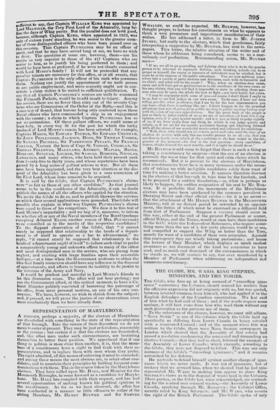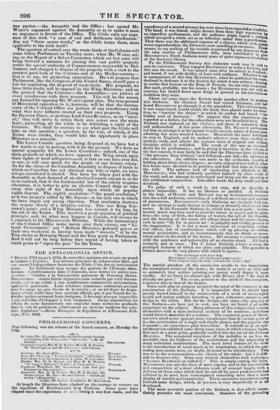TIIE GLOBE, MR. WARD, KING STEPHEN, MINISTERS, AND THE TORIES.
THE Globe, who fires up at being accused of "exceeding igno- rance" concerning the Colonies, should remind his readers that the offensive expression did not originate with us, but was quoted, between inverted commas, from himself, who had applied it to the English defenders of the Canadian constitution. We bat said of him what he had said of them ; and if the words require some apology, it will best come from him who used them without any such provocation as the previous use of them.
To the substance of the charge, however, we must still adhere. " Nova Scotia " is one of the colonies which the Globe held up specifically as differing from Lower Canada in being satisfied with a nominated Council ; and at the moment wheu this was written by the Globe, there were Nova Scotian newspapers in London which showed that the Assembly of that colony had passed a resolution contletnning the nominated awl demanding an elective Council,—that they had in short, followed the example of the Assembly of Lower Canada ; which example, according to the Globe, they were not disposed to follow. This was our only instance of the Globe's "exceeding ignorance; " and it remains untouched by his dekince.
He pretends to defend himself against another charge of igno- rance which we never made. It was not of ignorance, but of trickery that we accused him, when we showed that he had mis- represented Mr. WARD in making him appear to share King STEPHEN'S views as to the disposal of waste laud in the Colonies. Three parties, as the Globe has since acknowledged, arc contend- ing for the control over colonial wastes,—the Assembly of Lower Canada, speaking through Mr. Itositucrc ; the Colonial Office, secretly ruled by King STEPHEN : and N1r. W ARD, who asserts the right of the British Parliament. The Globe spoke of only two parties —the Assembly 'and the Office ; but quoted Mr. WARD'S argument against the Assembly so as to make it seem an argument in favour of the Office. The Globe calls our expo sure of this trick "a case of cool and deliberate falsification." Are not "these severe words," as the Globe terms them, more applicable to the trick itself? The question of control over the waste lands of the Colonies will come before Parliament on Tuesday next; when Mr. WARD, act- ing on the Report of a Select Committee which sat last year, will bring forward a measure for placing this vast public property under the special authority of Commissioners responsible to Par- liament, and charged to dispose of the property with a view to the greatest good both of the Colonies and of the Mother-country- that is to say, for promoting emigration. He will propose that Parliament, like the Congress of the United States, should pass a law for regulating the disposal of waste lands. His proposal, we have little doubt, will be opposed by the Whig Ministers ; and on the ground that the Colonies— the Assemblies— are jealous of every interference with their property. This will be the reason put forward for opposing Mr. WARD'S great plan. The true ground of Ministerial opposition to it, however, will be that the bureau- cracy of the Colonial Office are jealous of any interference with what they have hitherto treated as their own property. Using Sir GEORGE GREY, or perhaps Lord Jcixsr RUSSELL, as an "uten- sil." they will strive to retain their own power over the waste lands, pretending all the while to be defending a right of the Colonies. We shall be curious to see what part the Globe will take on this question ; a question, by the way, of which, if the Tories were awake, they would take the opportunity to place Ministers in a minority. The Lower Canada question being disposed of, we have but a few words to say in parting with it tar the present. We have no special sympathy for the Lower Canadians : indeed, one of the main grounds on which we have opposed the Whig attack upon their rights of local self-government, is that no one here ever did, or can, or will care much for the people of any distant colony. As for the claim of the Canadian Assembly to dispose of lands to which no Canadian has yet obtained any title or right, we have always considered it absurd. Nor have we taken part with the Assembly in their demand of an elective Council, except in so far as to contend, that if the fundamental law of the colony requires alteration, it is better to give an elective Council than to take away that right of the Assembly upon which all popular rights depend. The eighth resolution—" the penal resolution," as it was proper)y called by Mr. GROTE—is the only one to which we have urged any strong objection. That resolution destroys the magna charta of a helpless colony. This was King STE- PHEN'S point : and a Whig Ministry has carried it for him, by the aid of the Tories. This involves a gloat question of political principle, and, let what may happen in Canada, will always be a reproach to the MELBOURNE Ministry. While the bureaucracy of the Colonial Office make merry over their victory, our" Li- beral Government,' our " Reform Ministers,"d should grieve at their own weakness in having been made " utensils " of by the Tory clerks in Downing Street and the Tory party in Parliament. And it will not be long before they repent of having taken so much pains to " ripen the pear " for the Tories.



























 Previous page
Previous page